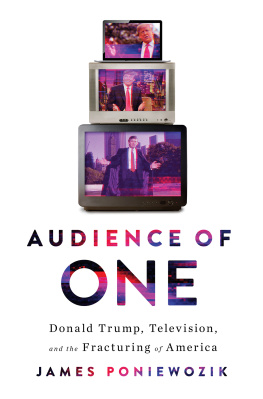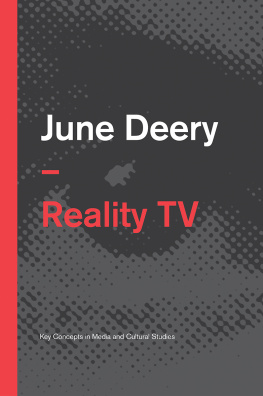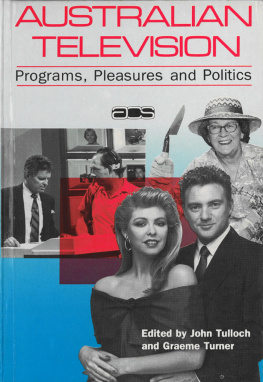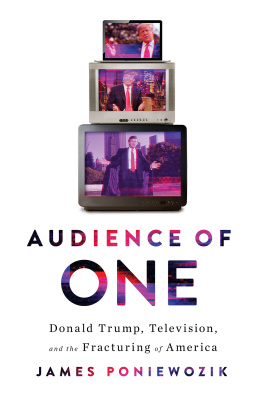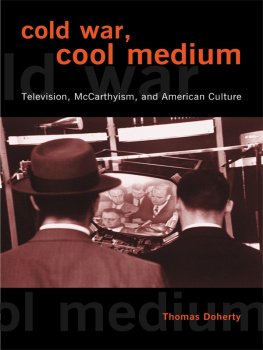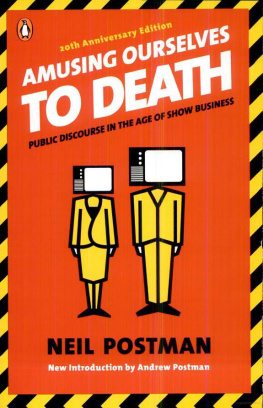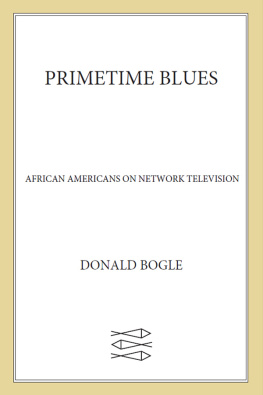Contents

AUDIENCE
OF
ONE
DONALD TRUMP, TELEVISION,
AND THE FRACTURING OF AMERICA
JAMES
PONIEWOZIK

LIVERIGHT PUBLISHING CORPORATION
A Division of W. W. Norton & Company
Independent Publishers Since 1923
Copyright 2019 by James Poniewozik
All rights reserved
First Edition
For information about permission to reproduce selections from this book,
write to Permissions, Liveright Publishing Corporation, a division of
W. W. Norton & Company, Inc., 500 Fifth Avenue, New York, NY 10110
For information about special discounts for bulk purchases, please contact
W. W. Norton Special Sales at specialsales@wwnorton.com or 800-233-4830
Book design by Lovedog Studio
Production manager: Beth Steidle
Library of Congress Cataloging-in-Publication Data is available
ISBN 978-1-63149-442-0
ISBN 978-1-63149-443-7 (ebook)
Liveright Publishing Corporation, 500 Fifth Avenue, New York, N.Y. 10110
www.wwnorton.com
W. W. Norton & Company Ltd., 15 Carlisle Street, London W1D 3BS
For Beth,
my audience of one
For I do not exist: there exist but the thousands
of mirrors that reflect me. With every acquaintance I make, the population of phantoms resembling me increases. Somewhere they live, somewhere they multiply. I alone do not exist.
Vladimir Nabokov, The Eye
What is a cold child? A sadist. What is childish behavior that is cold? It is sadism.
George W. S. Trow,
Within the Context of No Context
Man is the most vicious of all animals, and life is a series of battles ending in victory or defeat.
Donald J. Trump, People magazine
CONTENTS
THE GOSSIP COLUMNIST SAW HIM COMING FIRST.
In October 1980, Rona Barrett, recently lured away from ABCs Good Morning America by NBC, was putting together a one-hour prime-time special for her new network. Miss Rona, as she was called, was a morning-TV superstar, a beguiling presence with a crown of platinum-frosted hair who drove mercilessly for Hollywood scoops. She was the sort of reporter who was disdained by more serious (generally, and not coincidentally, male) journalists, yet who had a better understanding of the world than they did: what moved people, the narratives that shaped their interior lives, the changes bubbling up in the culture. NBC wanted to groom her as a news personality and burnish her respectable credentials.
She decided to do an interview special about rich people. Ive always felt that money, power, and sex is all that anybody really cares about, she would say years later. She realized in 1980, before the Reagan years began, before Lifestyles of the Rich and Famous premiered, that wealth would become a chief form of celebrity in America. And she intuited that, in the decades to come, this celebrity might ultimately lead to more than mere economic power.
For Rona Barrett Looks at Todays Super Rich, which aired in July 1981, she interviewed a half-dozen entrepreneurs, including fashion magnate Diane von Furstenberg; John Johnson, the founder of Ebony magazine; and a young New York real-estate scion named Donald Trump. He perched on a couch in his apartment overlooking Central Park, wearing a tie diagonally striped in five shades of brown, as she asked him about ambitions, connections, and family money.
In one section of the interview, which was left out of the primetime special and surfaced on YouTube decades later, the conversation took a turnto leadership, the Iran crisis, Americas stature in the world. Then something made Barrett ask a question most reporters would never think to raise with a thirty-four-year-old wannabe regional mogul: Would you like to be president of the United States?
I really dont believe I would, Rona, he said. The problem, he added, was television. Capable peoplehe defined those as people who head major corporationswere not interested in running for office. TV had ruined the process, because it favored inoffensive nice guys.
Somebody with strong views, he said, and somebody with the kind of views that are maybe a little bit unpopular, which may be right, but may be unpopular, wouldnt necessarily have a chance of getting elected against somebody with no great brain but a big smile... Abraham Lincoln would probably not be electable today because of television. He was not a handsome man, and he did not smile at all. He would not be considered to be a prime candidate for the presidency, and thats a shame, isnt it?
When the special aired, TV critics, already dismissive of Barretts hire, panned it. The Washington Posts Tom Shales was especially amused that Barrett introduced the Trump segment with the line, Some say the age of Trump has just begun.
Thirty-five years later, Donald Trump, a political gadfly who had played a businessman for fourteen seasons on NBCs The Apprentice, called in to the Fox News morning show Fox & Friends, the day before he would announce what would be his successful campaign for president.
Fox & Friends was Trumps second TV home. Hed had a weekly segment, Mondays with Trump, for four years, weighing in on national politics and recapping his elimination decisions in the Apprentice boardroom. It was friendly territory, but there was an obvious issue, and even Fox & Friends couldnt ignore it: Trump was famous for being obnoxious, and a lot of people hated the sight and sound of him.
Cohost Brian Kilmeade phrased it more gently. Are you worried, Donald Trump, that maybe what resonates in New York and New Jersey and the northeast wont resonate in the south and the west coast, where theyre maybe a little bit laid back?
I dont think it matters, Trump said. I dont think this is going to be an election based on real popularity.
It was essentially the opposite of what he had told Rona Barrett half a lifetime ago. But heres the thing: he was not wrong either time.
In 1980, a person like Trump could not have won an election fought on TV. (In 1980, The Apprenticea game show on which viewers cheer a businessman who lives in a golden tower as he fires his employeescould not have been a hit either, except maybe as a dystopian parody like the ones in the movie Network.) And Trump was not a fundamentally different person in 2016, when he ran a campaign that would not have been possible had he not spent so much of the intervening decades on TV.
What had changed in the meantime? TV had changed, which is to say, America had. This book is my attempt to describe how.

ON OCTOBER 2, 1984 the year Donald Trump was opening his first casino, Harrahs at Trump Plaza, in Atlantic Citythe media scholar Neil Postman gave the keynote address at the Frankfurt Book Fair. The fairs theme, befitting the title year of George Orwells 1984, was Orwell in the year 2000.
The choice of this theme is a mistake, Postman said. To be precise, it is half of a mistake. Orwells nightmare of totalitarian thought control was, he said, applicable in about half the world, particularly the Soviet Bloc. But in the West, he argued, another warning was more apt: Aldous Huxleys, in Brave New World. In Huxleys dystopia, the people were controlled not by force and propaganda but by pleasuregames, drugs, and phenomenally immersive entertainments. Orwell thought we would be marched single-file and manacled into oblivion, Postman said. Huxley thought we would dance ourselves there, with an idiot smile on our face.

